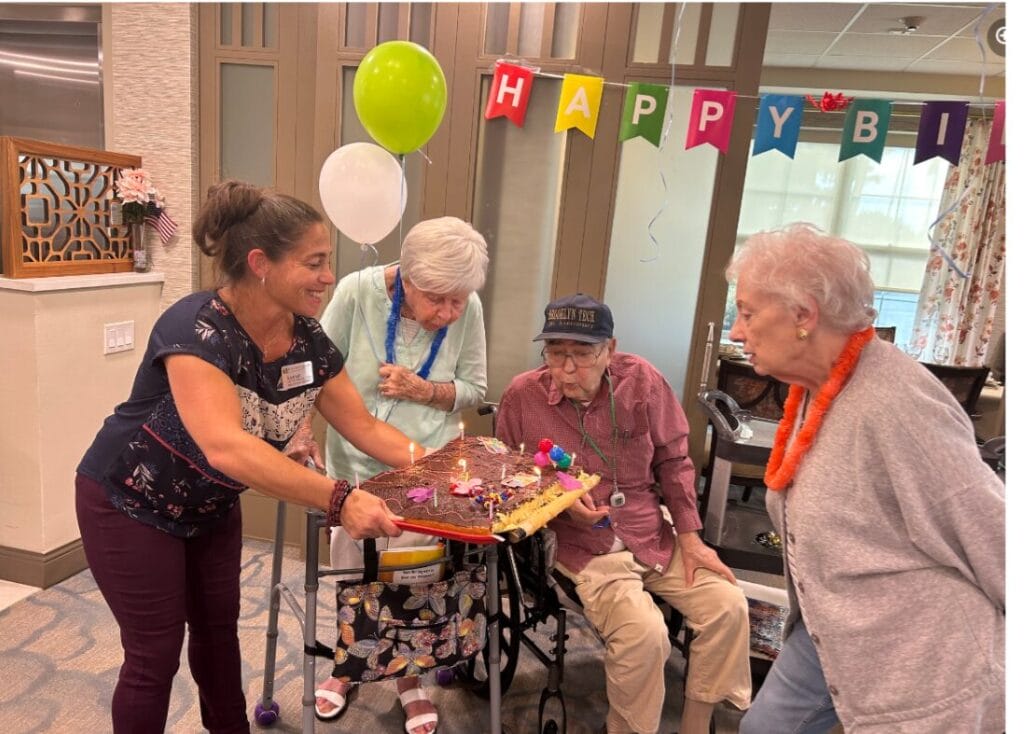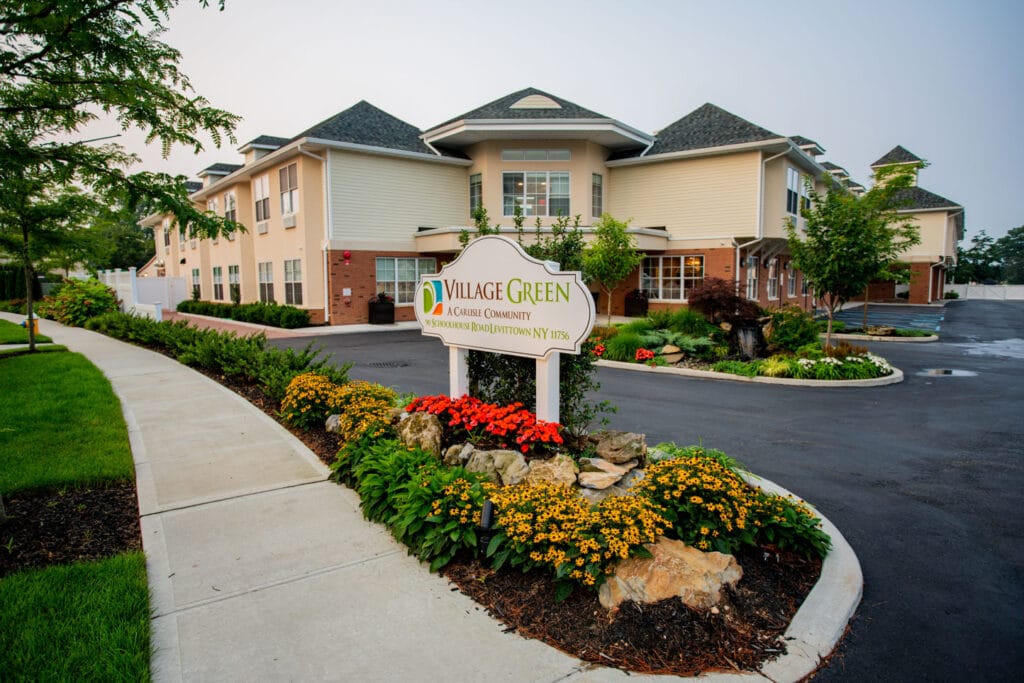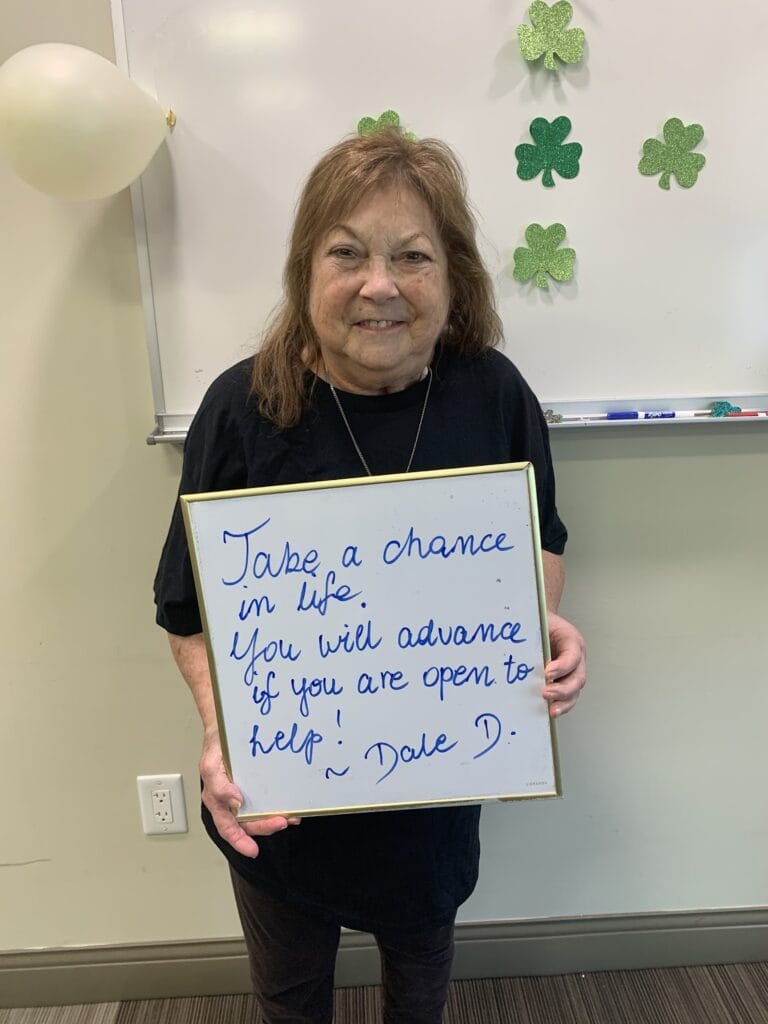Crossword puzzles, Scrabble, and Sudoku: what do all of these memory care activity ideas have in common? You probably already knew this, but they’re great for our brains!
Crosswords, in particular, may even help delay the onset of accelerated dementia decline. If you’re reading this, you’re probably wondering what you can do to better care for a loved one with dementia or memory-related issues.
Find the right activity, and you’ll see your loved one happy for days.
Pick an activity they’re not enthusiastic about, and you could be in a real pickle. We completely understand: picking the right activities for memory care can be a challenge.
But have no fear. We’re here for you — and we have plenty of ideas.
At Village Green, we’re Long Island, New York’s leading authority for providing quality care solutions to seniors with dementia and other memory-related conditions. If you’re looking for engaging and meaningful activities that you can do with your loved one, look no further.
Here are 55 engaging and meaningful memory care activity ideas for all types of senior citizens.
What to consider before engaging in memory care activities
Given that dementia diagnoses have increased over the last decade, you couldn’t have picked a better time to learn about memory care activity ideas. We say that, because we have so much knowledge at our fingertips to better serve our elderly loved ones.
A few items to consider to better serve loved ones and engage them in memory care activities is:
- Opting for memory care activity ideas where your senior can’t fail
- Choose activities that stimulate the mind, body, and other senses
- Understand the tools at your disposal to help support your loved one
We’ll dive deeper into these topics and considerations in the next three sections.
Opt for activities without a pass/fail component
When it comes to older adults with dementia, you want to choose a variety of activities that keep people with dementia engaged and excited. Part of creating exceptional memory care activities for people with dementia is choosing failure-free activities.
Failure-free activities are activities that don’t have a component where someone has made a mistake. Win-or-lose games are examples of activities with a component of failure.
Activities that are failure-free also:
- Align with a loved one’s abilities
- Have clear instructions, are simple, and don’t need a great deal of maintenance
- Allow older adults with dementia to complete the games without experiencing frustration
By choosing fun activities that don’t focus on failure, you can help your loved one live their best lives and ensure their happiness and physical well-being. We’ll discuss physical well-being in the next section.
Choose memory care activities that stimulate the mind and body
Some of the best memory care activity ideas help stimulate a person’s mind and body. For example, back-and-forth conversation can help stimulate our brains. Brain stimulation is especially important for people who live with dementia or Alzheimer’s disease.
If you’re struggling to come up with ideas, consider what your loved one enjoyed doing most in the past. Were they into chess, crossword puzzles, trivia, learning languages, or more?
You can use your loved one’s previous hobbies as inspiration for stimulating activities for both mind and body.
Whether you’re a caregiver (or not) for your loved one, you’ll want to understand how you can support your loved one through each activity. In sum, the right support can improve your loved one’s quality of life.
Choose memory care activities that stimulate the mind and body
Some of the best memory care activities help stimulate a person’s mind and body. For example, back-and-forth conversation can help stimulate our brains. Brain stimulation is especially important for people who live with dementia or Alzheimer’s disease.
If you’re struggling to come up with ideas, consider what your loved one enjoyed doing most in the past. Were they into chess, crossword puzzles, trivia, learning languages, or more?
You can use your loved one’s previous hobbies as inspiration for stimulating activities for both mind and body.
Whether you’re a caregiver (or not) for your loved one, you’ll want to understand how you can support your loved one through each activity. In sum, the right support can improve your loved one’s quality of life.
Understand how you can support your loved one
Though most memory care activities are fairly easy to follow, people with dementia will still need a caregiver’s support. Caregivers can support people living with dementia by sticking to the following caregiving best practices:
- Guide people with dementia on the parts that seem to give them the most trouble.
- Chunk each part of the activity into tasks. Tackle one task at a time.
- Offer gentle guidance. Never criticize or correct a person with dementia. The activity is always up for interpretation.
- Remember that someone experiencing dementia may interpret an activity in a different way than you expected. If the person seems to be enjoying the activity — but is participating in it in a different way than you expected — that’s okay! So long as the person isn’t harming themselves or others, you can continue to encourage them to enjoy the activity the way they like.
- Encourage your loved one to do their best.
- Be prepared to pivot at a moment’s notice. If you see that your loved one starts humming a tune during a game of Scrabble, go ahead and turn on some music. Especially for patients in the early stages of dementia, giving someone with dementia different ways to access an activity can help them better live with memory loss.
Knowing how to support people with dementia will help you create healthy activities that are fun and engaging for people with all different forms of dementia.
55 Engaging and meaningful memory care activities (breakdown)
Whether your loved one lives with moderate dementia, Alzheimer’s, or stage-7 Lewy body dementia, these simple activities can help you help your loved one make the most of life.
We grouped our 55 total memory care activities into the following categories:
- Physical activities
- Cognitive and cerebral activities
- Tactile activities
- Creative activities
- Pet and animal-based activities
- Holiday-based activities
- Activities that help people with dementia reminisce
- Technology-based activities
We’ll dive into each in the rest of this article.
Physical activity ideas and games
Some physical activity ideas and games include:
- Dancing
- Light resistance band stretches
- Tai chi or qi gong
- Yoga
- Walking
- Gardening
Physical activities can improve cognitive functioning and psychological health. What’s more, exercise is crucial for all people, but especially for people with Alzheimer’s disease and memory-related conditions.
Exercise may also help reduce the risk of other conditions like heart disease, stroke, type-2 diabetes, and hypertension. By planning activities with a physical component, you can help increase the longevity and overall health of people with dementia.
At our memory care community, we offer a variety of activities to better care for people with dementia. Whether playing blow-up beach volleyball, adapted baseball, or boxing, the possibilities are endless. So long as you use your imagination, there’s no limit to what you can do with people with dementia.
If you’re looking for help in creating your own adapted activity, don’t hesitate to reach out to us at any time. We’d be happy to teach you how to engage your loved one with the help of adapted physical activities.
Cognitive memory activity ideas and games for residents
Alas, as dementia progresses, one of the symptoms of dementia is memory loss. You can help people with dementia delay the onset of memory decline by finding activities that help boost brain activity.
Common cognitive and brain-related memory activity ideas include:
- Jigsaw puzzles
- Word search puzzles (like crosswords, Sudoku, and Scrabble)
- Maze games
- Card games
- Bingo
- Dice-related games
As dementia progresses, many memory care communities choose to provide cognitive stimulation therapy to patients with dementia. Cognitive stimulation therapy is an evidence-based treatment that offers themed activities for dementia patients.
A series of group activities — like blow-up ball tosses, chair exercises, or stretching — is conducted over a handful of sessions. These sessions help with memory recall, as the sessions stimulate the brain.
We’ll take a look at some of these social and creative, brain-stimulating activities in the next section.
Creative and social activities for memory care residents

Creative and social activities can make a world of difference for seniors with dementia. Even though assisted living communities, skilled nursing, and memory facilities may differ in the level and extent of services they offer, you’ll find that most senior living facilities use social and creative activities to nurture the health of people with dementia.
Creative and social activities include music lessons, arts and crafts, painting, collaging, and going out with others on social outings. As a side benefit for residents in memory care facilities, most memory care services will include a creative social activity to help residents build community.
Common creative and social activities for memory care residents include:
- Music-based activities
- Arts and crafts, and visual arts at large
- Activities based on organizational and life skills
Music-based activities
Music is auditory food for the soul. Music-based therapy is known to give a person with dementia a feeling of familiarity.
The reason is that music helps promote reminiscence. A few common social, music-based activities are:
- Listening to classic hits together in common living areas
- Taking up piano classes or other group music classes
- Hosting karaoke nights
- Providing music-streaming services or portable music players for listening
At Village Green, we have an internet lounge and entertainment room where residents can enjoy their favorite tunes. Consider providing access to a music-streaming service or MP3 player of choice to your loved one to help them manage symptoms of dementia.
Visual arts — and arts and crafts — activities
For visual learners, visual arts, arts and crafts, and art therapy can help engage residents and allow them to express their creativity. Art therapy has been known to help engage the brain and help seniors with the worst dementia symptoms.
Many memory care communities and home care services include arts and crafts in their weekly programming. Common examples of art-based activities include:
- Scrapbooking
- Collaging
- Painting
- Sculpting and creating pottery
- And more!
Aside from fostering self-esteem and improving cognitive functioning, art can help reduce stress and help cope with life’s challenges.
Activities based on life skills
Speaking of life, life skills-based activities can help seniors better navigate daily living activities. Life skill-based activities are meant to help older adults reflect on and feel proud of the life they’ve lived — and the life they’re living today.
Since many seniors with dementia tend to revert to a time when they were younger, many life skills-based activities are based around different stages of life in from a senior’s life.
Common life skills activities include activities in the following settings:
- Office-style work: residents can work at a desk that’s chock full of office-related items, such as a computer, sticky notes, files, notebooks, and more.
- Hobby workshop areas: many memory care communities set aside discrete areas for seniors to practice their favorite hobbies in retirement. Whether your loved one enjoys home improvement, woodworking, or model airplane flying, creating dedicated spaces to practice cherished hobbies can be a huge help to those living with dementia.
- Pet care areas: areas where pets can be walked, played with, and fed can also offer many therapeutic benefits to those living with dementia.
- Childcare areas: Areas to play with children who visit — or areas to play with child-like dolls — have been found to give people with dementia a greater sense of security, according to the National Library of Medicine (2022).
Tactile memory care activity ideas
Many of the above-mentioned activities fall under the category of tactile memory care activities. The word “tactile” refers to our sense of touch.
Many tactile activities help improve executive functioning, increase attention span, and help maintain problem-solving skills. Activities like knitting offer sensory stimulation to seniors with dementia.
What’s more, tactile activities help activate other areas of the brain that can help slow down cognitive decline. A few tactile activities we use at our memory care community include:
- Crafting with color-coded and textured sensory items of different sizes, shapes, and materials.
- Sorting fabrics like velvet, silk, or wool
- Knitting
- Playing with fidgets
- Playing guessing games (an example would be sifting through a bin of textured food — say raw rice or dry beans — to determine what object lies below the surface)
- Hand massages
- Spa nights
- Hanging ornaments on a Christmas tree
- Petting cherished pets (we’ll discuss the role pets play for seniors with dementia in the next section)
Pet and animal-based therapy activity ideas
Pet therapy — also known as animal-assisted therapy — can lift people’s moods. This activity is great for dementia patients as petting a therapy animal can help soothe a person, support a person’s health and well-being, and increase pleasure, relaxation, and joy.
At Village Green, we often bring residents to the local zoo or even invite our favorite canine and equine friends to our Village’s outdoor recreation area.
A few ways to involve your furry friends in your loved one’s life include:
- Taking a trip to the aquarium
- Going bird-feeding
- Visiting the local zoo
- Taking a stroll to a bird or butterfly sanctuary
- Petting your favorite pets
Holiday-based memory care activity ideas
The holiday season can be an excellent time for fun memory care activities. Celebrating holidays can help those with memory conditions to remember cherished holiday memories.
A few holiday-based activities include:
- Hosting festive parties
- Offering religious worship services
- Theme-based holiday activities
- Celebrating unconventional holidays like National Donut Day
Life review therapy (reminiscence therapy) activities
Especially for people with dementia, staying connected to loved ones becomes ever more important with age. At Village Green, we always invite family and friends to stop by for a visit.
During visits, we encourage residents and their families to:
- Video chat with one another.
- Enjoy a fresh and gourmet meal in our pub and bistro.
- Browse through old photo albums together.
- Revel in cherished family heirlooms together.
- Create memory boxes together. Memory boxes include cherished items like photo albums, clothing, or other cherished artifacts from a person’s past.
As always, many of these activities can be adapted with technology. Let’s take a look at how in the next section.
Technology-based memory care activity ideas
Many people with dementia benefit from playing stimulating games. Many of these games can be adapted as technology and the times change.
Ways to keep your loved one engaged with technological games and activities include:
- Playing video games like Tetris, Nintendo Wii Sports, and more
- Visiting museums with immersive tours
- Watching live streams of gamified educational classes
- Participating in virtual reality (VR) gaming
- Adapting ordinary tasks — like giving a person a phone call — with an online voice over internet protocol (VoIP) phone service
As technology continues to develop, the possibilities are endless. After you’ve combed through this list, all that’s left to do is build out an activity calendar.
An activity calendar will ensure a consistent routine they can depend on for whatever life’s journey throws their way.
Table: Sample memory care activities calendar
| Saturday & Sunday | Open | Open | Open | Open |
| Monday | 9 AM: Music therapy and movement | 11 AM: Memory-related card games | 2 PM: Arts and crafts or art therapy | 5 PM: An evening or day outing |
| Tuesday | 9 AM: A morning stroll | 11 AM: A trip to a locale in our local Patchogue, NY community | 2 PM: Blow-up ball volleyball or other physical therapy | 5 PM: Karaoke |
| Wednesday | 9 AM: Yoga and adapted boxing | 11 AM: Book club | 2 PM: Pet therapy | 5 PM: Spa night or other themed event |
| Thursday & Friday | Open | Open | Open | Open |
Receive help with building a winning memory care activity schedule
Our top 55 engaging and meaningful memory care activity ideas for people with dementia can be broken down into the following categories:
- Physical activities
- Cognitive and cerebral activities
- Tactile activities
- Creative activities
- Pet and animal-based activities
- Holiday-based activities
- Activities that help people with dementia reminisce
- Technology-based activities
All of the activities listed in the sections above can be broken down, organized, and adapted to your loved one’s needs. But, the most important part of each memory care activity idea is the execution of it.
You want to make sure your loved one feels relaxed, calm, and present during each of these different activities. One of the best ways to do so is to build out a consistent memory care activity schedule.
And that’s where having a winning care team can help. Can we give you a hand?
At Village Green, we’ve been providing memory care options and support to families for years. Our expert team has over 30 years of collective experience with caregiving and building out activities for seniors with dementia.
We even teach local college courses online each week to help educate our local community on best caregiving practices. If you’d like to be a part of our Village, don’t hesitate to contact us anytime.
Or, if you just need a little extra help knowing how to care for your loved one, we’re just a call away. Give our senior concierge team a call anytime, and we’d be more than happy to lend you a helpful and friendly hand.
Frequently asked questions (FAQ) about memory care activities

What are some of the best activities for people with dementia?
The best activities for people with dementia:
- Help people reminisce on and recall precious memories
- Are creative and social in nature
- Boost brain functioning
- Slow the onset of memory loss
- Engage the senses
- Are relevant to a senior’s history and past
Common categories of activities that fulfill these checklist items include:
- Physical activities
- Cognitive and cerebral activities
- Tactile activities
- Creative activities
- Pet and animal-based activities
- Holiday-based activities
- Activities that help people with dementia reminisce
- Technology-based activities
What happens if a memory care activity idea isn’t working out?
Even the “best-laid plans of mice and men often go awry,” Robert Burns once said. If your loved one becomes agitated, confused, panics, or isn’t having it, not to worry!
The following five tips can help you correct your course of action:
1. Try chunking the activity into manageable and easy-to-follow steps
2. Offer gentle guidance throughout the activity
3. Help break down the most complex parts of the task
4. Connect the activity back to something meaningful and engaging for the person.
5. Be open to how the person interprets the task, and don’t correct them beyond what’s necessary for their safety and well-being.
Keeping these five tips in mind will help ensure a smoother execution of the activity.
How do I know which activity is right for my loved one?
Simply put, activities that give a person with dementia purpose, that connect them with their values, and that engage a variety of senses tend to be the best types of activities for people with dementia.
Whether you’re browsing through old photos or engaging in adapted boxing, the best activities are those that connect with who the person is. If you ever need help coming up with ideas, don’t hesitate to reach out to us.
We’d be happy to point you in the right direction!
“Some of the most competent, kind, and attentive caregivers…”

“Some of the most competent, kind, and attentive caregivers work at Village Green Assisted Living.
Jessica, Sarah, and Kristin love their work and residents.
They try their best to maintain a high quality of life for each and everyone in their care. I value that I can call them with my questions and/or my concerns, knowing I will receive a prompt response.
The facility itself is beautiful, and the daily programs keep the residents engaged and active.” – Mary Z., grateful Village Green family member




